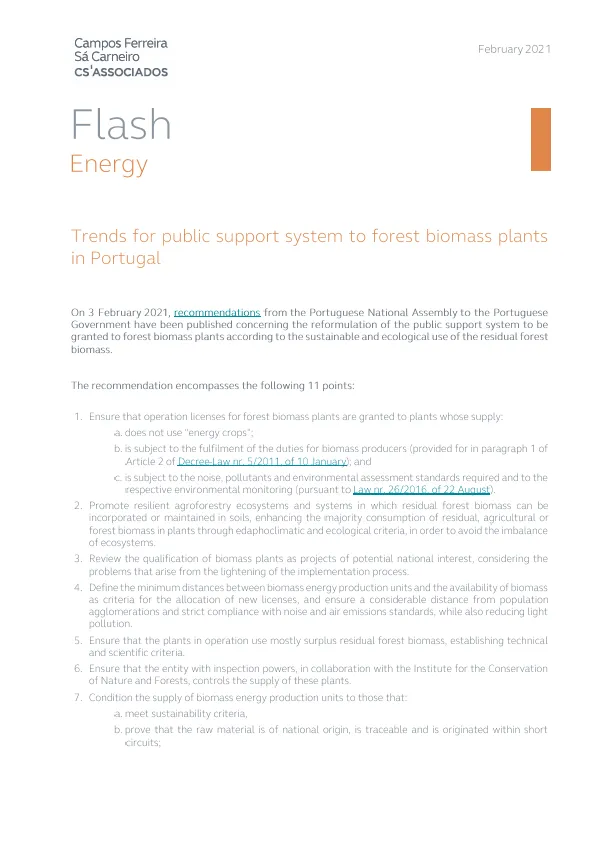Connaissances
Trends for public support system to forest biomass plants in Portugal

Duarte Brito de Goes

Mariana Silva Pereira

On 3 February 2021, recommendations from the Portuguese National Assembly to the Portuguese Government have been published concerning the reformulation of the public support system to be granted to forest biomass plants according to the sustainable and ecological use of the residual forest biomass.
The recommendation encompasses the following 11 points:
1. Ensure that operation licenses for forest biomass plants are granted to plants whose supply:
a. does not use "energy crops";
b. is subject to the fulfilment of the duties for biomass producers (provided for in paragraph 1 of Article 2 of Decree-Law nr. 5/2011, of 10 January); and
c. is subject to the noise, pollutants and environmental assessment standards required and to the respective environmental monitoring (pursuant to Law nr. 26/2016, of 22 August).
2. Promote resilient agroforestry ecosystems and systems in which residual forest biomass can be incorporated or maintained in soils, enhancing the majority consumption of residual, agricultural or forest biomass in plants through edaphoclimatic and ecological criteria, in order to avoid the imbalance of ecosystems.
3. Review the qualification of biomass plants as projects of potential national interest, considering the problems that arise from the lightening of the implementation process.
4. Define the minimum distances between biomass energy production units and the availability of biomass as criteria for the allocation of new licenses, and ensure a considerable distance from population agglomerations and strict compliance with noise and air emissions standards, while also reducing light pollution.
5. Ensure that the plants in operation use mostly surplus residual forest biomass, establishing technical and scientific criteria.
6. Ensure that the entity with inspection powers, in collaboration with the Institute for the Conservation of Nature and Forests, controls the supply of these plants.
7. Condition the supply of biomass energy production units to those that:
a. meet sustainability criteria,
b. prove that the raw material is of national origin, is traceable and is originated within short circuits;
prohibiting the use of quality wood, biomass "energy crops" and residual biomass from distant territories or wood from monocultures of energy crops, without prejudice to the use of residual biomass from productive forest crops and the exceptional use of residual biomass created by calamities or other extraordinary events.
8. Redesign public subsidies to forest biomass plants, making these supports dependent on criteria weighted according to the type and quality of biomass and its sustainability, and subject to the presentation of an action plan for a 10-year term.
9. Adapt the installed capacity of biomass energy production units to the availability of residual forest biomass in the country and to regional and local energy needs, such as residential or industrial areas where energy consumption for heating is high and where there is a need for forest management to reduce the risk of fire.
10. Try to ensure the contribution of these forest biomass plants to forest management and fire risk reduction in the national territory, developing, from 2021, a registration system that allows the monitoring and traceability of the origin of forest biomass, and articulating the use of residual forest biomass for energy purposes with the instruments of prevention of rural fires and territorial management.
11. Regulate the obligation of submission of a report every six months to the Institute for the Conservation of Nature and Forests concerning the type and origin of the residual forest biomass used.
Duarte Brito de Goes
Mariana Silva Pereira